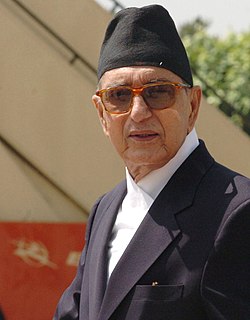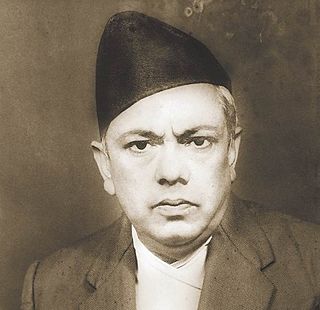Related Research Articles

Tribhuwan Bir Bikram Shah was King of Nepal from 11 December 1911 until his death. Born in Kathmandu, the capital city of Nepal, he ascended to the throne at the age of five, upon the death of his father, King Prithvi Bir Bikram Shah, and crowned on 20 February 1913 at the Nasal Chowk, Hanuman Dhoka Palace in Kathmandu, with his mother acting as regent. At the time, however, the position of monarch was mainly titular, with real power in the country residing in the powerful, conservative Rana family, which supplied the country with its hereditary prime minister. The Rana period is known for the tyranny, debauchery, economic exploitation and religious persecution by the rulers.

The Nepali Congress is a social-democratic political party in Nepal. It is the largest opposition party in the House of Representatives and the National Assembly.

Nepal Ratna Girija Prasad Koirala, affectionately known as Girija Babu, also known as G.P. Koirala, was a Nepalese politician. He headed the Nepali Congress and served as the Prime Minister of Nepal on four occasions, including from 1991 to 1994, 1998 to 1999, 2000 to 2001, and from 2006 to 2008. He was the Acting Head of State of Nepal between January 2007 and July 2008 as the country transitioned from a monarchy to a republic.

Gopal Prasad Rimal was a poet from Kathmandu, Nepal. According to scholar Michael J. Hutt, "he is remembered as the first "revolutionary" Nepali poet and the first to reject the use of meter".
The People's Democratic United Front was a short-lived political coalition in Nepal, formed by the Communist Party of Nepal and the Nepal Praja Parishad in July 1951 to fight against the Rana-Nepali Congress combine. Tanka Prasad Acharya was the chairman of the front and Shailendra Kumar Upadhyaya the general secretary. Except for the two main political parties, constituents of the front included the Nepal Youth Association, the All Nepal Youth Association, All Nepal Workers Association, All Nepal Women's Association, All Nepal Students Federation, Progressive Study Group and Social Reform Association.

Indirect presidential elections were held in Nepal in July 2008. The first round of voting was held on 19 July, with a run-off on 21 July. The Nepalese Constituent Assembly (CA) elected in April 2008 elected a new president and vice-president after the Fifth Amendment to the Interim Constitution was passed on 14 July. This would be the first President to be elected after Nepal became a republic a few months earlier.
United Democratic Party was a political party in Nepal, active in the 1950s. The party was led by K.I. Singh. The party was aligned with the Nepal Praja Parishad of Tanka Prasad Acharya, and opposed to the Nepali Congress
Nepali Jan Congress was a political party in Nepal. The party was led by Bhadra Kali Misra. In 1954 it was included into the national government. The party later merged into the Praja Parishad of Tanka Prasad Acharya.
The Praja Rajyam Party is political party in India. PRP is a Centre to centre-left party

The Krishak Sramik Party was a major anti-feudal political party in the British Indian province of Bengal and later in the Dominion of Pakistan's East Bengal and East Pakistan provinces. It was founded in 1929 as the Praja Party to represent the interests of tenant farmers in Bengal's landed gentry estates. In 1936, it took the name of Krishak Praja Party and contested the 1937 election. The party formed the first government in the Bengal Legislative Assembly. After the partition of British India, it was reorganized as the Krishak Sramik Party to contest the 1954 election, as part of the United Front. The coalition won the election and formed the provincial government in the East Bengal Legislative Assembly.
Kunwar Indrajit Singh or Kunwar Inderjit Singh, popularly known as Dr. K.I. Singh or just K.I. Singh was a Nepali politician and revolutionary who served as the 20th Prime Minister of Nepal in 1957. He was a key Nepali Congress organizer in the 1951 Nepali Revolution, and was a leader in its militant wing, the Muktisena, who later refused to recognize the Delhi Accord and was forced to flee the country following a revolt he took part in. In 1955 he returned and formed the United Democratic Party, and following the installation of the Panchayat system, was also elected as a member to the Rastriya Panchayat. He was known as the "Robin Hood of the Himalayas", and was very popular throughout the country.

Tanka Prasad Acharya was a Nepali politician who served as the 19th Prime Minister of Nepal from 1956 to 1957. He was one of the founders and the leader of the Nepal Praja Parishad, the first political party in Nepal with the goal of removing the Rana Dynasty's dictatorship.

Dasharath Chand is martyr of Nepalese Democratic Movement and a politician of Nepal who was active in starting a political revolution in Nepal during Rana rule. He was born at Baskot of Baitadi district of Nepal in 1903 AD as a son of Sher Bahadur Deuba (Chand).

Dharma Bhakta Mathema was a professional body builder as well as a founding member of Praja Parishad party of Nepal. He introduced modern body building techniques in Nepal. But he is better known for his contribution to the Nepalese struggle for freedom against hereditary prime ministership of the Rana dynasty. He was killed during the freedom movement, and he is duly recognized as one of the four martyrs of Nepal. His statue is found, along with other three martyrs, in the Martyr's Gate memorial in Kathmandu. A school is also established on his name 'Shahid Dharma Bhakta School (SDB)' currently located in Nakkhu, Lalitpur, Nepal by her daughter Renu Devi which runs the classes from montessori to grade 10.

The Nepal Praja Parishad was the first attempt to form an organization to lead the revolution against the Rana dynasty in Nepal. Led by Tanka Prasad Acharya, the group was founded in 1936, and is seen as the first political party in Nepal. The organisation collapsed after their plot to assassinate multiple members of the Rana regime was discovered, and some of its key members were executed.

Ganga Lal Shrestha was a Nepalese revolutionary who was executed by the autocratic Rana regime. He is honoured as one of the four martyrs of the Nepalese revolution. He was a member of the clandestine political organisation named Nepal Praja Parishad that started a movement in 1939 to remove the Rana oligarchy and establish democracy in Nepal.

Gopal Das Shrestha (1930–1998), a prominent journalist, created the history of English journalism in Nepal. He published and edited the first English daily newspaper The Commoner on 15 July 1956 from Kathmandu. He was an influential intellectual, a remarkable compelling writer and a creative thinker.
The Uttar Pradesh Praja Party was a political party in Uttar Pradesh, India. The party represented interests of zamindars, and contested the elections of 1951-52. The party was formed to oppose the Indian National Congress policy of abolition of the zamindari system.

The revolution of 1951 in Nepal, also referred to as Sat Salko Kranti, was a political movement against the direct rule by the Rana dynasty of Nepal. It marks the beginning of the political awakening and democratic movements in Nepal, and resulted in immediate abolition of the institutionalized hereditary Prime Minister system in Nepal.
References
- ↑ Levi, Werner. Politics in Nepal , published in Far Eastern Survey, Vol. 25, No. 3, (Mar., 1956), pp. 39-46
| This article about a Nepalese political party is a stub. You can help Wikipedia by expanding it. |